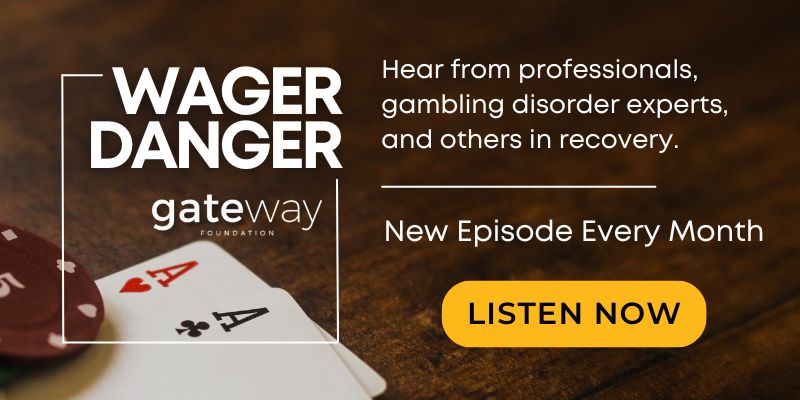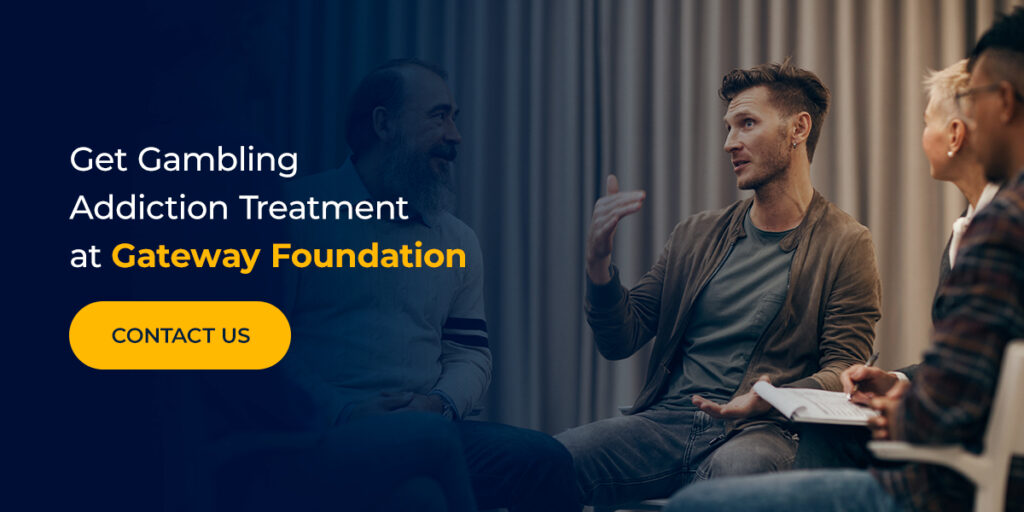- Mar 6
- Addiction
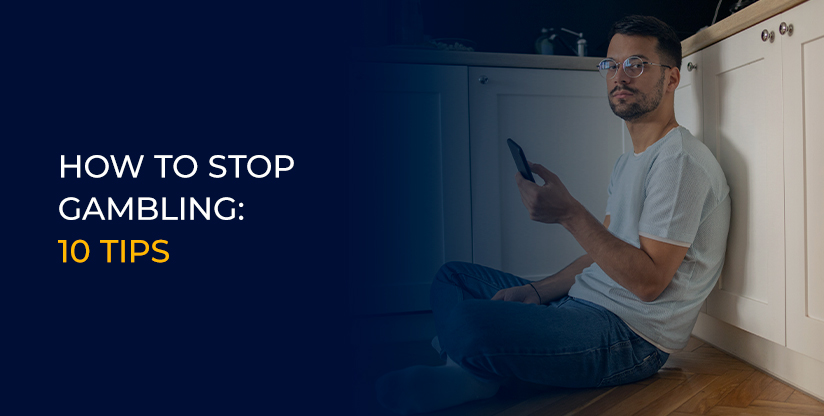
Gambling addiction can significantly impact a person’s life, from their health and finances to their relationships. In the past, gambling mainly occurred in casinos. Today, it’s possible to easily bet and gamble online. While compulsive gambling can be challenging to manage, you can break the cycle. Keep reading to learn how to deal with gambling and seek support for yourself or someone you know.
Practical Ways to Stop Gambling
Gambling addiction can affect everyone from teenagers to adults. Approximately 6 million people in the U.S. struggle with it. This disorder’s leading characteristic is an overpowering urge to gamble, no matter the consequences. Many problem gamblers experience financial difficulties, failed relationships and poor health outcomes.
While addiction is a complex condition, there are many treatment options to help you overcome it and regain control of your life. Additionally, you can learn how to manage gambling on your own with these tips.
1. Understand the Problem
Accepting that you are struggling with a gambling addiction is the first step in managing it. If you recognize the signs and symptoms, you can work on modifying the behavior and start feeling better.
The American Psychiatric Association lists the signs and symptoms of gambling addiction as follows:
- Feeling a thrill when gambling
- Taking more risks
- Increased craving for gambling
- Reliving and romanticizing gambling experiences
- Using gambling to escape negative emotions
- Feeling guilty or remorseful after gambling
- Needing financial support
- Failed past attempts to stop gambling
There are also a few social problems associated with gambling, including lying about your activities or borrowing or stealing money to support your habit. As soon as you recognize these signs, you should learn how to stop gambling and regain control of your life. Additionally, you might seek an assessment from a professional who can help you address the issue.
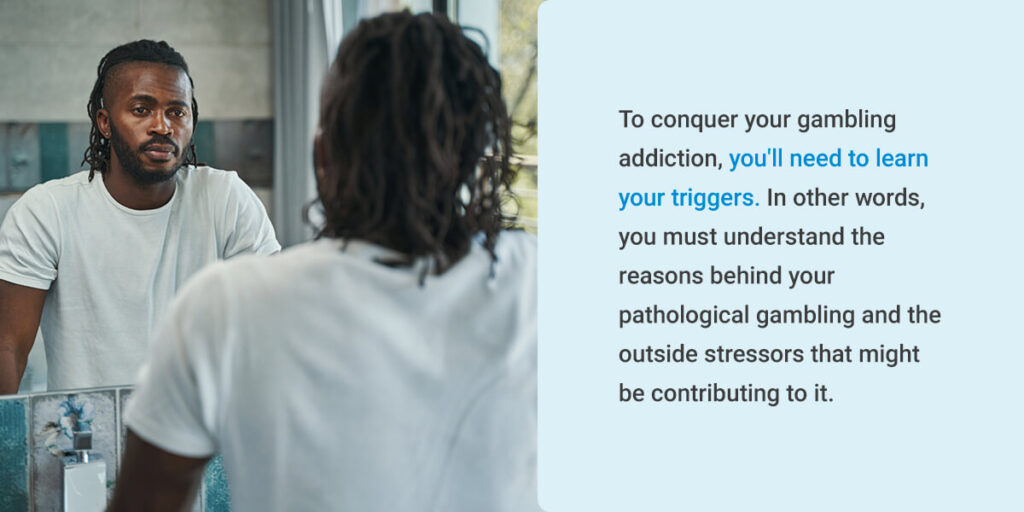
2. Pinpoint Your Triggers
To conquer your gambling addiction, you’ll need to learn your triggers. In other words, you must understand the reasons behind your pathological gambling and the outside stressors that might be contributing to it. Triggers can be any situations, thoughts, feelings or behaviors that make you want to gamble.
For instance, being around friends with the same habits triggers many problem gamblers. Additionally, you might be more likely to gamble when you are under the influence, since drinking can lower your inhibitions and increase risk-taking behaviors. Those with gambling addiction are at an increased risk of developing a substance use disorder, which can arise from the same stressors.
To identify your triggers, you might start by documenting them in a journal. You can include the type of gambling, time spent and the amount of money you lost. Next, write down the thoughts, feelings and situations that occurred before and during the gambling session to understand what caused the craving.
3. Identify Thoughts and Feelings
The urge to gamble can be intense, and while you’re experiencing it, you might feel like it will last forever. However, these feelings will pass. Paying attention to your emotional wellness can help you regain control over them and build resilience against pathological gambling.
If you have increased cravings to gamble, take a second to record the following.
- Thoughts: You might get preoccupied with daydreams of gambling and reliving past moments.
- Feelings: Perhaps you’re feeling bored or stressed about something, leading to cravings.
- Coping techniques: There are specific ways you can learn how to cope with gambling, such as postponing the activity or distracting yourself with a hobby.
Do negative feelings like depression or stress cause your gambling? In this case, an excellent coping mechanism might be to attend therapy or discuss your emotions with a trusted friend or family member. Do you look for excitement and find yourself gambling to combat boredom? Look for new hobbies to fulfill that need for a thrill. You can use several effective coping techniques to stop your gambling addiction.
4. Avoid High-Risk Situations
Steering clear of high-risk situations is essential when trying to stop your gambling addiction. It’s also helpful to prevent isolation. Instead of spending hours playing online poker, you might call family members or friends to meet for coffee. Or, you could distract yourself with an activity like watching a movie, practicing mindfulness exercises like deep breathing or going to the gym.
It can be challenging to avoid cravings if you find yourself near a casino or around triggers that might cause you to gamble. Try the following techniques to prevent high-risk situations:
- Stay away from casinos and online gambling sites.
- Cancel your credit cards.
- Don’t take out loans.
- Never carry large amounts of cash with you.
- Delete sportsbook apps from your smartphone and other devices.
- Do not socialize in venues where gaming takes place.
- Avoid the people, places and activities you associate with gambling.
Avoiding your triggers can help prevent any thoughts or emotions from arising that encourage gambling. If your usual way to and from work goes past a casino, take an alternate route. Change the channel if watching sports makes you want to bet. Additionally, you can plan by leaving credit cards and nonessential cash at home and limiting the total amount of money you carry when you leave the house.
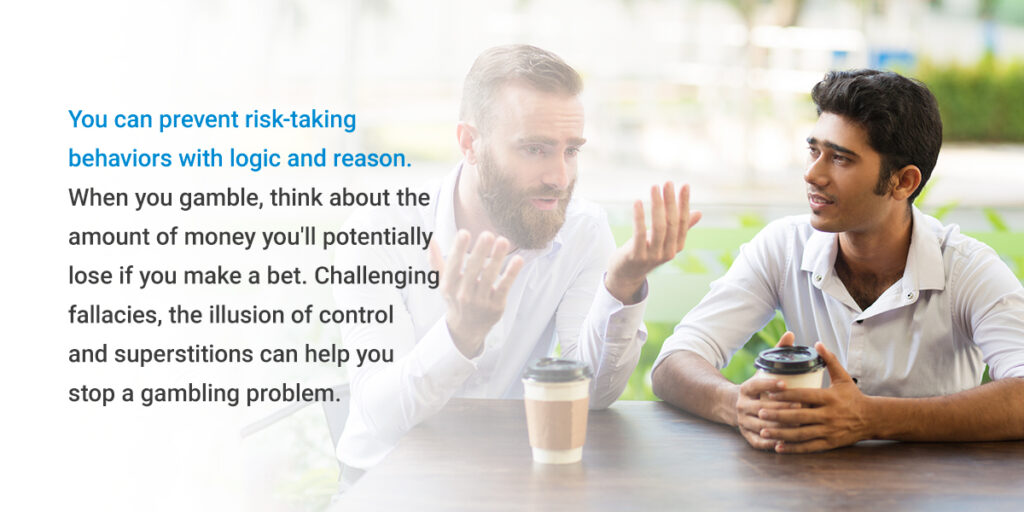
5. Challenge Your Beliefs
It also helps to challenge negative thinking habits, such as the illusion of control, irrational beliefs and the gambler’s fallacy. These unhealthy thought patterns can increase compulsive gambling, but you can reduce them by identifying and altering them.
- Gambler’s fallacy: The gambler’s fallacy is when you believe a random incident is less likely to occur due to a prior event. For instance, a person might think their chances of losing a game are lower if they just lost, and that their next attempt will be a winner. However, the odds are identical.
- Superstitious thinking: Superstitious beliefs are also common among those who gamble. You might think random occurrences have meaning. For example, if you’re betting in keno, you might pick a number you believe is lucky and place your money on that. Remind yourself that superstitious thinking arises from sheer coincidence, and luck has nothing to do with it.
- The illusion of control: This false thought pattern is typical in problem gamblers. It is the belief that you can control the outcome of any game. To prevent this thought, remind yourself that no technique or trick can change what happens, whether you’re gambling online, playing cards, betting on a sports game or sitting at a slot machine. Each bet or decision is random, and the results are out of your control.
You can prevent risk-taking behaviors with logic and reason. When you gamble, think about the amount of money you’ll potentially lose if you make a bet. Challenging fallacies, the illusion of control and superstitions can help you stop a gambling problem.
6. Delay the Decision
Delaying the decision to gamble allows time for cravings to pass so you can be more in control.
Try the following next time you have the urge to gamble:
- Relax and focus on staying calm.
- Take deep breaths to slow down and quiet your thoughts.
- Distract yourself with an activity like a warm bath or reading a book.
Tell yourself that you’ll wait at least an hour, allowing the desire to dissipate. Visualize what could happen if you gave in to the cravings, such as how regretful or anxious you’d feel if you lost your family’s grocery money.
7. Recognize the Benefits of Stopping
A gambling disorder can lead to several adverse outcomes, from draining your finances to destroying close relationships. While shame and guilt can be dangerous in recovery, a small amount of reflection can motivate you to get better.
When you think about how gambling has affected your past, you can make strides to avoid it in the future. You might consider your financial hardships, the loved ones you’ve harmed and the strain gambling has on your physical and mental health. Calculate the money and time you’ve spent gambling and think about better ways you could spend those.
At the same time, consider all the positives of overcoming your gambling disorder. Imagine the better ways you could spend your money and how finding a more practical outlet for your stressors can improve your mental health. Set goals you can achieve to stop gambling and reasons behind them, such as making your family proud, having more money to put toward a vacation or being able to pay bills.
Try not to dwell too much on the past — instead, let it motivate you to change and grow. Be kind and patient with yourself as you work to overcome a gambling disorder.
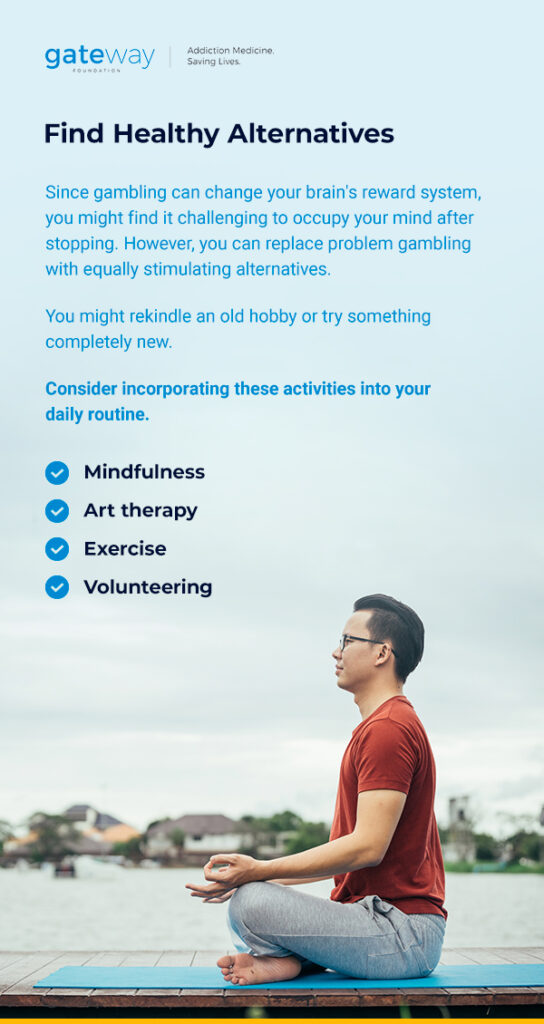
8. Find Healthy Alternatives
Since gambling can change your brain’s reward system, you might find it challenging to occupy your mind after stopping. However, you can replace problem gambling with equally stimulating alternatives. You might rekindle an old hobby or try something completely new.
Consider incorporating these activities into your daily routine.
- Mindfulness: Meditation, yoga and deep breathing exercises can all help you slow down and shift your thoughts to the present. You can catch any unhealthy thought patterns and release the stress that can lead to gambling.
- Art therapy: You might make music, draw or paint, crochet or participate in another creative endeavor — anything that will get your mind off urges and toward something rewarding is essential. Studies show that therapeutic art can boost mental health, which will help you as you work toward overcoming problem gambling.
- Exercise: Numerous studies have reported exercise’s physical and mental health benefits. Staying active is especially vital when dealing with substance use disorder or gambling addiction. You might go on a daily walk, lift weights or ride your bike — any physical activity you enjoy that can get your mind off gambling should do the trick.
- Volunteering: Studies show that volunteering can make us happier. Reducing stress and depression triggers is essential to overcoming addiction. You can volunteer at a hospital or your local animal shelter to stop your gambling addiction.
Set new goals and tasks for yourself each day. As you focus on these activities, you can better cope with gambling urges as they arise. When you replace risky gambling behaviors with more positive ones, you can change your maladaptive coping mechanisms for good.
9. Practice Gratitude
You can work to release any negative thoughts with an attitude of gratitude. Keep track of your goals and progress as you manage your gambling addiction. List everything you’re grateful for to increase positivity and shift away from unhealthy behaviors.
Believe in yourself and the ability to change. You might journal about your achievements, strengths and attributes. Let yourself feel optimistic about your future, perhaps for the first time in years. Write a daily gratitude list to stay aware of how much better your life is without gambling. The goal is to improve your self-esteem and help prevent relapse.
10. Seek Social Support
Social support is a vital component of compulsive gambling recovery. You can discuss your addiction with trusted friends or family members to keep them informed. They might be able to help you avoid gambling triggers and let you discuss stress or anxiety that could cause the addiction.
You might also join a support group, such as Gamblers Anonymous. Here, you can share your story in a nonjudgmental setting with those who might have similar experiences. In support groups, you’ll find connections you may not have even realized you needed.
How to Get Help for Gambling Addiction In Illinois
While a gambling disorder can result in numerous challenges, you can’t overcome it with willpower and self-help alone. Professional treatment can help you get back on the right track with options like these.
- Therapy: At Gateway Foundation, we offer various evidence-based treatments, including cognitive behavioral therapy and dialectical behavioral therapy. Therapy sessions can help you change how you think and feel about gambling and ways to overcome triggers.
- Medications: Mental health professionals can provide you with a dual diagnosis of co-occurring disorders like depression and gambling addiction. From there, you can receive prescribed medicines that ease any symptoms, such as antidepressants or mood stabilizers.
- Support groups: Many people find speaking to others in similar situations beneficial. Discussing your goals and setbacks and providing advice to others in support groups can encourage you in recovery.
Seeking professional gambling addiction can help you overcome the cycle and refine skills you’re already using. At Gateway Foundation, we offer outpatient care services, which can be more affordable and flexible than inpatient care. You can attend support groups and therapy sessions at the times that work best for you, allowing you to be with friends and family while in recovery.
Get Gambling Addiction Treatment at Gateway Foundation
If you or someone you know needs help for a gambling problem, contact us today. Gateway Foundation specializes in treating addiction, including compulsive gambling. Our team of experts will work with you to identify why you use gaming to cope and replace those self-destructive urges with healthier tools.
We offer various treatments to treat gambling addiction and its underlying causes. Our highly trained team provides individualized care in a compassionate setting, giving our patients a better chance of lasting success

